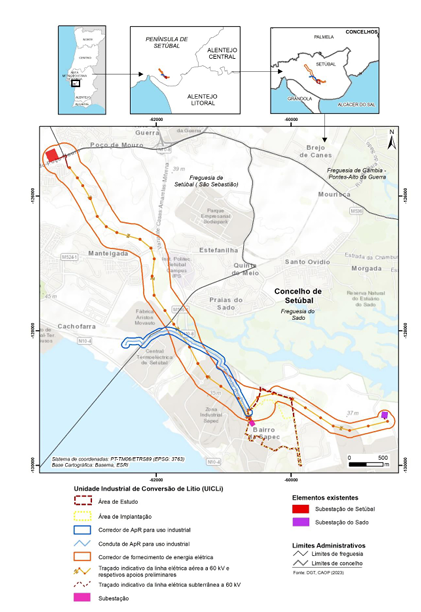The industrial unit of the Galp/Northvolt consortium expects to create more than 350 direct jobs and come on stream in April 2028. Europe's largest refinery expects to use Portuguese lithium.
The Setubal lithium refinery project has seen its projected cost rise from $700 million, estimated in 2022, to a value between €1,100 and €1,300 million.
The Industrial Lithium Conversion Module (UICLi) is being developed by Aurora Lithium Consortium, Galp and Northvolt of Sweden.
Operations are now scheduled to start in 2028, two years later than originally planned. The project is still awaiting a final investment decision from the promoters. Each year, enough lithium will come out of here to power the batteries of 650,000 cars.
The European Investment Bank is considering investing €825 million in the unit, which will be the largest in Europe when it opens.
The Environmental Impact Assessment (EIA) is open for public consultation until October 24.
In terms of jobs, the promoter expects to create 357 direct jobs and 3,000 indirect jobs, “of which 70% are highly qualified, also at national level, by promoting the sustainable growth of the lithium battery value chain in Portugal.” through the production of a product that is not currently part of the country’s production base,” according to the document.
Asked by JE, Galp explains the increase in costs and the project coming into operation in 2028: “The increase in investment value, currently estimated at between 1.1 and 1.3 billion euros, is due to the increased complexity of the project due to an effort to improve engineering processes and performance in the environmental areas – full use of wastewater, reduction of emissions, renewable energy component, etc. – and economic and increase its capacity from 28 to 32 million tons per year.”
Regarding when they can make a final decision on the project, the Portuguese company says: “Galp and Northvolt remain committed to the implementation of the Aurora project. However, given the nature and complexity of the project, the development of procedures (including access to national or European funds that allow us to compete with other projects and which have not yet been secured) and the basic studies to make the final investment decision continue. It is also important to have certainty about the start date of production of spodumene concentrate from the mines in Portugal.
In the environmental impact assessment it can be read that the expected life of the refinery is 25 years, with the aim of producing 32 thousand tons of lithium hydroxide monohydrate per year, “which can be used in the manufacture of cathodes for electric batteries and can be used to a large extent in national and international markets, in line with the national strategy for energy transition, through its contribution to achieving the established objectives, by producing a material that allows the gradual replacement of vehicles with combustion engines with electric cars.”
The company plans to use lithium extracted in Portugal. “Spodumene concentrate will be used as the main raw material, obtained from exploration operations in Portuguese territory and/or other ore sources located on a global scale. It is also planned to use lithium sulphate or lithium carbonate, with Li equivalent to 8 t/h of spodumene, as intermediate raw material, with the aim of improving production capacity.
The promoters explain that this unit, “as a chemical conversion industry, will use as a raw material concentrated spodumene, from lithium mining, to obtain lithium hydroxide monohydrate as a final product, used to manufacture cathodes for electric batteries. However, it should be noted that, given market trends, there is a possibility that UICLi will also use other intermediate lithium products as raw materials resulting from primary processing in the value chain (such as lithium sulphate and technical grade lithium carbonate).”
This unit will also have a lot of “appetite”: annual electricity consumption will exceed 397 GWh, with natural gas exceeding 17.6 million cubic meters of natural gas and more than 142 thousand cubic meters of water “for industrial use, arising from treated wastewater (ApR) to be provided by SIMARSUL”.
In terms of location, eight sites in Portugal and one in Spain were analyzed. Setúbal, in the Sabic Bay Industrial Park, was chosen because of “the best consideration between the logistical capacity of the industrial park, the availability of services, the possibility of industrial coexistence and, in terms of environmental impact, what is the best conception of commitment to circularity.”
This project has been recognized as a Project of Potential National Significance (PIN).
Positive and negative effects
Analyzing the environmental impacts, the promoter begins by saying that the project meets the PNEC 2030 targets “from a greenhouse gas (GHG) emission reduction perspective, as it will produce lithium hydroxide monohydrate (HLM), a component of lithium batteries.” Helping to support the energy transition and the gradual replacement of combustion engine vehicles with electric vehicles.
“In short, with regard to the global impact assessment, there are adverse and mitigable impacts that are generally classified as “not very significant”, and sometimes as “not significant” in the various environmental factors evaluated. Particularly noteworthy are the negative impacts identified within the scope of the social component, which are classified as very significant, namely “negative impact on economic activities” and “psychosocial adaptation of the population with very negative attitudes towards UICLi”. However, with regard to residual impacts, i.e. those that remain after the application of mitigation measures, only in the construction phase do very significant negative impacts remain on the cultural heritage (impact of an archaeological site – OIP Sapec 3 – found in excavation works (carried out) or significant in the social component and related to the movement of workers and materials during work. In the exploration phase, all residual impacts are positive and significant and relate to water resources and the social component.
In terms of positive impacts, the document highlights “the social and economic impacts associated, during the construction phase, with the use of local labour and the attraction of workers to the construction site. During the exploration phase, positive impacts include wealth creation, economic dynamism for the municipality and the region, and the promotion of employment opportunities, particularly through the economic attractiveness of the municipality and employability in the manufacturing sector. During the exploration phase, the use of water for reuse (ApR) is also highlighted, which contributes to the circularity of the project, reducing pressure on water resources since the project does not have to resort to water retention in the natural environment. At the national level, promoting the growth of the lithium battery value chain and the cycle of job creation.
Expected consumption
- Drinking water consumption from the public network – 16,562 m3
- ApR consumption for industrial use – 142,272 m3
- Electricity consumption – 397.2 GWh/year
- Natural gas consumption – 17,647,276 m3
The company says it will ensure that “all energy used in the industrial unit will be 100% renewable, either by purchasing it with guarantees of origin from suppliers, or by promoting renewable energy projects in the surrounding area.”
Setubal lithium refinery slides for two years
The planned lithium refinery in Setúbal is two years behind schedule, the disclosure comes in a European Investment Bank (EIB) document dated March and revealed this week by Sifted.
Therefore, the Aurora project, implemented by Galp and the Swedish company Northvolt, is expected to start operating only in 2028.
When it was announced in 2022, the consortium stated that “operations should commence by the end of 2025 and commercial operations are scheduled to begin in 2026.”
The European Investment Bank is considering investing €825 million in the unit, which will be the largest in Europe when it opens.
The two companies announced the alliance in 2021 with the goal of producing 32,000 tons of lithium hydroxide annually, enough to equip batteries for 650,000 cars annually.
Contacted by Jornal Economico, Galp/Northvolt said they “remain committed to the implementation of the Aurora project.”
“However, given the nature and complexity of the project, the development of procedures (including access to national or European funds that allow us to compete with other projects and which have not yet been secured) and the basic studies to take the final decision on the investment that has determined the delay in the implementation of the project. It is also important to have confidence in the start date of production of spodumene concentrate from the mines in Portugal.”
BMW Cancels $2 Billion Contract With Northvolt
In June, it was revealed that BMW had cancelled a €2 billion contract for batteries for its electric cars.
Swedish company Northvolt, co-founded by Paolo Cerruti (pictured), has failed to meet battery delivery deadlines, Reuters reported at the time, citing German press.
This week, news also came out in Sweden that the company was reviewing plans to build a giant battery factory in the Scandinavian country with the capacity to produce 100 gigawatt-hours of batteries, employing up to 1,000 workers.
The initial target will be to start operations by the end of 2024, with an order book of up to $50 billion.
The company has an operating plant in northern Sweden, another under construction in Germany, and a project for a plant in Canada.
In Portugal, Northvolt has a project to build a lithium refinery in collaboration with the Aurora Galp consortium.
The industrial unit will be located in the SABIC Bay Industrial Zone and will involve an investment of 700 million euros and create 200 direct jobs. Under the agreement, Northvolt is committed to purchasing 50% of the refinery’s annual production.
The Aurora project will have the capacity to produce enough lithium hydroxide to power 700,000 electric cars, with an initial production capacity of between 28,000 and 35,000 tonnes of lithium hydroxide, a key material for lithium-ion batteries. The Portuguese-Swedish consortium initially had plans to start the process by the end of 2025.



